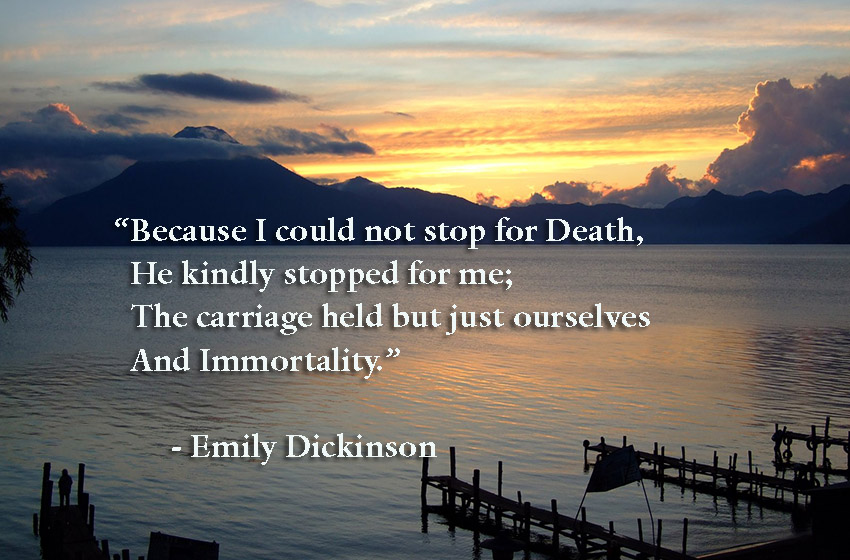
Short Poem for Death: A Lyrical Exploration of Mortality
In the ethereal realm of poetry, the theme of death has captivated poets for centuries. The Short Poem for Death, a concise and poignant verse, encapsulates the myriad emotions and contemplations that arise when confronted with our mortality.
This poetic form invites a profound introspection, a grappling with the inevitable nature of life. Through a careful choice of words, evocative imagery, and a haunting rhythm, the Short Poem for Death seeks to capture the essence of a transformative experience.
Poetic Styles for Short Poems on Death
Several poetic styles lend themselves effectively to the Short Poem for Death:
- Free Verse: Free verse poems abandon traditional rhyme and meter, allowing for a raw and unadorned expression of emotions.
- Haiku: Japanese haiku, with its brevity and emphasis on nature, can offer a strikingly poignant perspective on death.
- Elegy: An elegy is a poem mourning the loss of a loved one, often exploring themes of grief and remembrance.
- Sonnet: The sonnet’s 14-line structure and rigid rhyme scheme can provide a framework for exploring the complexities of death’s impact.
- Extended Metaphor: Extended metaphors draw parallels between death and other experiences, offering fresh insights and a deeper understanding of its nature.
Poems of Loss and Remembrance
- Elegy for the Departed
In the hushed chamber where shadows dance,
A heart entombed in silence’s trance.
Memories flicker, like fading light,
A poignant tribute to life’s brief flight.
- The Shadow of Grief
A cloak of sorrow drapes upon the soul,
As memories of laughter fade to toll.
Grief’s icy fingers trace upon the heart,
A symphony of loss that tears apart.
Poems of Contemplation
- Mortal Musings
Life’s journey echoes with the ticking clock,
An ephemeral dance that can never mock.
Each passing second whispers of the end,
A truth we grapple with, oh friend.
- The Enigma of Death
A veil of mystery obscures its face,
A cosmic enigma with fathomless grace.
Is it oblivion or a portal to realms unknown?
A question that haunts our hearts, forever alone.
How to Write a Short Poem for Death
- Reflect on Your Own Mortality: Confront your fears and emotions surrounding death. Allow these insights to guide your choice of imagery and language.
- Explore Different Perspectives: Consider the perspectives of different characters, such as the dying, the bereaved, or even death itself. This can lend depth and resonance to your poem.
- Use Figurative Language: Metaphors, similes, and personification can elevate your poetry and create a deeper emotional connection.
- Seek Simplicity: While exploring complex themes, strive for clarity and brevity. A Short Poem for Death should distill emotions into their purest form.
- Pay Attention to Rhythm: The rhythm of your poem can evoke different moods and emotions. Consider the impact of line breaks, enjambment, and alliteration.
Tips for Reading Short Poems on Death
- Read Slowly and Attentively: Allow yourself time to absorb the nuances of language and imagery.
- Reflect on Your Own Experiences: Relate the poem to your own experiences with loss and contemplation.
- Identify the Emotional Impact: How does the poem make you feel? What emotions does it evoke?
- Consider the Poet’s Purpose: What message or insight does the poet seek to convey?
- Look for Symbolism: Pay attention to recurring images or motifs that may symbolize different aspects of death.
Frequently Asked Questions
Q: Why is the Short Poem for Death a popular genre?
A: Its brevity and focus on a single theme allow for a profound exploration of mortality, loss, and remembrance.
Q: What are some common themes in Short Poems for Death?
A: Themes include mourning, remembrance, the inevitability of death, and the search for meaning in the face of it.
Conclusion
The Short Poem for Death is a testament to the human experience. Through its poignant verses, it invites us to confront our mortality, to explore the complexities of grief, and to seek understanding in the face of the inevitable.
Remember to respect the original creators of these works. Do not plagiarize their work, but share it and give credit to the authors who poured their hearts and souls into these eloquent expressions. By embracing our shared journey through life and death, we can find solace and meaning in the brevity of our existence.
